Thumb through a cookbook full of healthy recipes, and you’ll probably find at least a few with chia seeds as an ingredient. These tiny little black seeds have become a staple ingredient for many health-conscious consumers as an excellent source of healthy fat, fiber, protein, and other nutrients. They come from a chia plant, also known as Salvia hispanica, and they contain several plant-based antioxidants that are thought to do everything from lowering the risk of heart disease to reducing cancer risk (per Healthline).
One of the things chia seeds are most known for is their fiber content, something that can be challenging to find in a typical American diet rich in processed foods and refined grains. According to an article in the American Journal of Lifestyle Medicine, getting enough fiber in your diet can improve digestive health, lower hypertension, and even reduce the risk of developing type 2 diabetes. The USDA’s FoodData Central lists a 1-ounce serving of chia seeds as having 9.75 grams of dietary fiber, with the recommended daily intake ranging between 21 to 38 grams (per Mayo Clinic).
Sometimes, you can have too much of a good thing, and that’s true for chia seeds. Here are the pros and cons of eating them every day.
The nutritional value of chia seeds
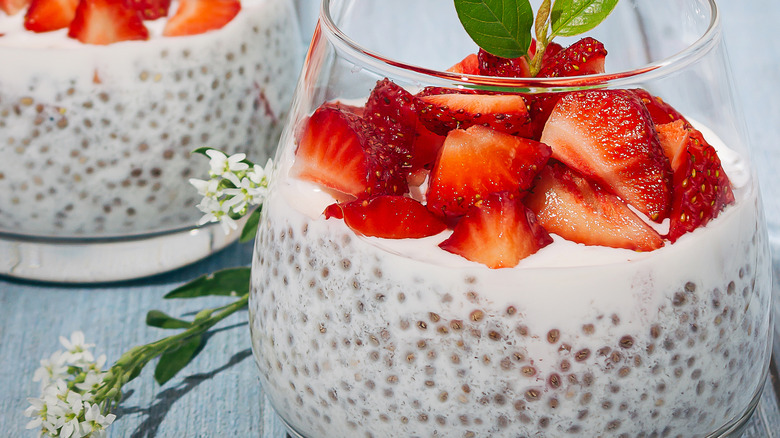
They might be tiny, but chia seeds are mighty in terms of nutritional value. These small seeds pack a big punch of nutrients into your diet, including calcium, iron, and fatty acids. They also have other important nutrients, like copper, folate, zinc, magnesium, and phosphorus, and have about 5 grams of protein in a small one-ounce serving, making them a well-rounded food that’s relatively easy to add to your daily meal routine.
Something to take note of, though, is that these crunchy seeds are pretty high in calories — in fact, a one-ounce serving yields about 138 calories, according to the USDA. If you’re watching how many calories you consume each day, this could be a problem for you. However, nutritionist Ellie Busby tells GoodTo that the reason chia seeds have a lot of calories is that they’re high in fat. “But most studies show that low-fat diets do not work for sustainable weight loss,” she adds. Busby also notes that the satisfying, full feeling chia seeds can give you might prevent you from wanting to eat more later, which balances the high calorie content.
You could boost your heart health
It is possible for a daily serving of chia seeds to stave off heart issues? Some evidence shows that it might be, mostly because of how the plant-based ingredient interacts with parts of the body that lend to overall heart health.
According to the American Heart Association, the high fiber content of chia seeds can reduce your appetite because they take a while to fully digest. The protein, minerals, and other nutrients in chia seeds also make them heart-healthy, according to registered dietitian Linda Van Horn. She adds that chia seeds “offer good sources of alpha-linolenic acid (ALA), which are unsaturated fatty acids that convert to omega-3 fatty acids typically found in fish.”
ALA is linked to reducing the risk of sudden cardiac death and (possibly) arrhythmia in women participants, one study published in Circulation found. However, the study found no significant benefits of ALA in preventing fatal coronary heart disease or nonfatal myocardial infarction.
Your bones might get stronger
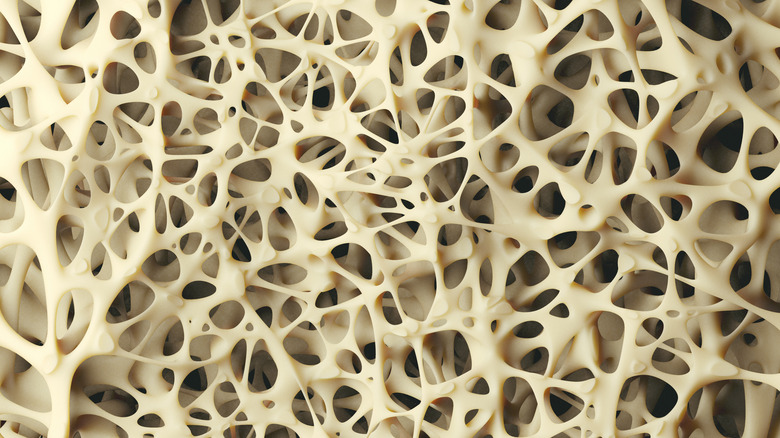
You might be surprised to learn that such a little seed that comes from chia plants can pack a big punch when it comes to your bones.
According to Summit Health, bone density is an important measure of potential risk for osteoporosis, which causes weakened bones that can break easily, even with minor falls. Women 65 and older and men 70 and older have heightened risks for bone density problems, as do people with prior fractures, low body weights, and certain conditions that can cause weakened bones.
However, chia seeds might lend a little help to your bones. A 2018 study published in Nutrients explored the long-term dietary intake of chia seeds on the musculoskeletal system of rats. After 13 months of eating chia seeds as 10% of their regular diet, the rats developed a significantly higher bone mineral content in their tibia than rats that didn’t eat chia seeds.
You might discover an allergy or sensitivity
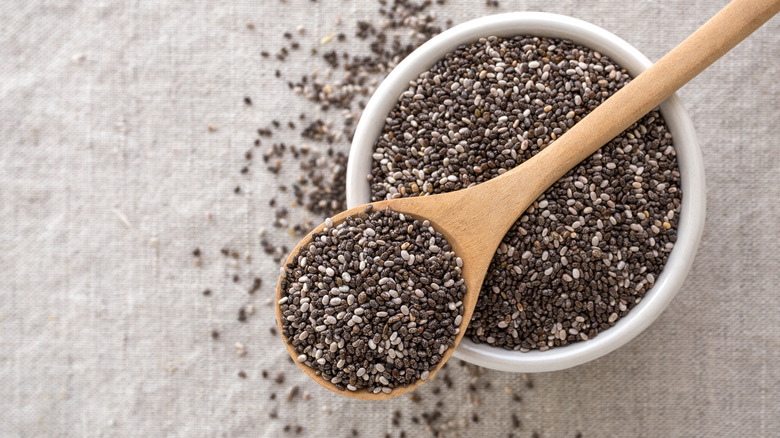
Some people are unaware that they have a food sensitivity or allergy to specific foods until they notice a pattern of symptoms after eating them or get tested. While rare, a sensitivity to chia is possible, and the outcomes could be severe.
A 2015 case study published in the Journal of Investigational Allergology and Clinical Immunology reviewed the case of a 54-year-old man. The man ate chia seeds over a few days to lower his cholesterol, but soon developed shortness of breath, dizziness, facial swelling, and other symptoms. Medical professionals on his case determined that the man had experienced the “first case of an IgE-mediated anaphylactic reaction induced by chia seeds.”
Research from 2019 also shows that people with sesame seed or hazelnut allergies may experience an allergic reaction to chia seeds after eating them (via Journal of Agricultural and Food Chemistry). Researchers chalk up the phenomenon to chia seed proteins having similarities to proteins in sesame seeds and hazelnuts. However, the sensitization seems to be more prominent with sesame seed allergies.
It may become easier to manage your weight
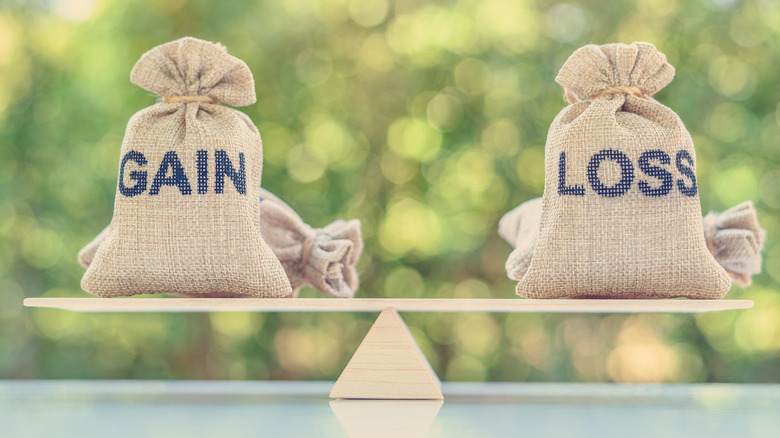
Chia seed advocates tout the benefits of eating the plant-based ingredient for weight management and weight loss. Can these little seeds really aid your dieting strategy?
It turns out that science supports the idea. A 2016 study published in Nutrition, Metabolism & Cardiovascular Diseases focused on the relationship between chia and weight management, specifically on people with type 2 diabetes falling into overweight or obese categories. The 77 participants split into two groups, one eating daily chia seeds and the other incorporating an oat bran-based food into their diets. After six months, the chia seed group lost more weight and waist circumference than the other group.
According to Everyday Health, TikTok users have jumped on the bandwagon of drinking chia water as part of a weight-loss diet. Unfortunately, there’s no evidence to back up drinking chia water for weight loss. However, registered dietitian nutritionist Tara Collingwood tells Everyday Health that chia seeds promote a feeling of fullness because of their high-fiber content, which could prevent you from digging into the snack cabinet as frequently to stave off hunger pangs.
You might lower your bad cholesterol
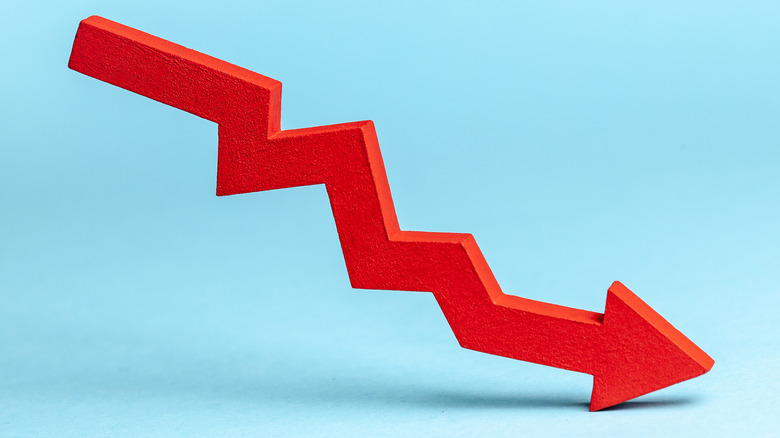
Your doctor probably talks to you about cholesterol and may check with each routine appointment, because cholesterol directly relates to heart health. LDL cholesterol is the bad one that can clutter your arteries, while HDL cholesterol moves LDL from the arteries to the liver. High triglycerides could compound a cholesterol problem by contributing to fat buildup in the arteries (via the American Heart Association).
Boosting HDL cholesterol and lowering LDL cholesterol is usually a good move to boost your heart health. To do that, you need a diet rich in cholesterol-lowering foods, which are usually those that contain a lot of soluble fiber and omega-3 fatty acids (per Mayo Clinic). Chia seeds are one of those foods that contain both. Furthermore, research shows that getting omega-3 fatty acids from plant sources like chia can lead to a 17% lower risk of cardiovascular mortality (via the Harvard T.H. Chan School of Public Health). A scientific review published in Planta Medica also found that women who consumed chia seeds for 12 weeks experienced improved total cholesterol, HDL, and LDL serum levels.
Your blood pressure could improve
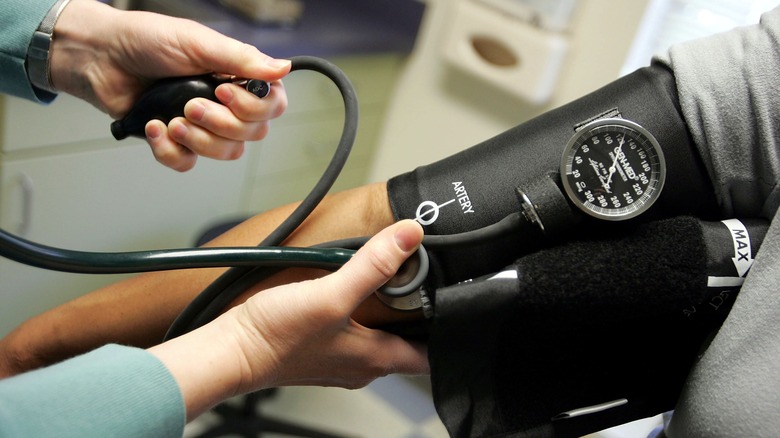
When you eat chia seeds every day, you might notice a bit of a drop in your average blood pressure. A study in Diabetes Care found that participants with type 2 diabetes who added Salba (chia) to their diets for 12 weeks had reduced their systolic blood pressure.
The possible drop from chia seeds could be very beneficial for people with high blood pressure. High blood pressure is known as a “silent killer” because many people don’t realize they live with it. Over time, frequent high blood pressure can cause your heart to overwork itself, resulting in strain that could weaken its muscles and damage blood vessels (via the National Institutes of Health).
One caveat: Healthline warns that people who take medication to lower their blood pressure should be careful about eating chia seeds. Combining the two could result in lower-than-ideal blood pressure, posing potential health problems. Therefore, check with your doctor first before adding chia seeds to your diet.
Your body fights inflammation

While inflammation is a natural response to pain, injury, and illness to boost the immune system, chronic inflammation can cause real problems for the body. If you’re an inflammation sufferer, you might want to find ways to add more chia seeds to your diet.
According to nutritionist Florencia Tagliavini, the omega-3 fatty acids that chia seeds contain fight inflammation naturally (via NutraMilk). Heal With Food also notes that chia contains other inflammation-fighting nutrients like zinc and copper. Plus, you can get their anti-inflammatory properties straight from the seeds themselves without needing to grind them like you would flaxseed, another plant-based ingredient with similar health benefits.
A 2020 study published in the Journal of Basic and Clinical Physiology and Pharmacology tested the ability of chia to reduce inflammation in arthritic rats. The researchers found that inflammation improved in both obese and non-obese rats after consuming chia seed oil and mucilage for 21 days.
Your body fights free radicals
Free radicals are atoms in the body that can damage and break down healthy cells (via MedicalNewsToday). Over time, free radicals can cause health conditions, like autoimmune disorders or diabetes. Most notably, they’re thought to be responsible for aging skin, causing wrinkles or dark spots typically associated with aging. Free radicals can stem from bad lifestyle habits, like smoking or unhealthy eating.
Some research suggests that chia seeds can combat free radicals in the body, potentially staving off such conditions and premature aging. Doctor Whitney Bowe explains to Fox News that “Chia seeds contain molecules with antioxidant and anti-inflammatory properties, which theoretically could be beneficial for both prevention of wrinkles, as well as the calming [of] inflamed skin.” Dermatologist Vicki Rappaport adds that chia seeds also fight free radicals with antioxidants while omega-3s keep the skin looking and feeling youthful. A 2016 scientific review also reports the findings from several studies noting the antioxidant power of chia seeds. One study found chia seed antioxidant activity was greater than other excellent sources.
You could have trouble swallowing them
Chia seeds have one very unique property that you might not know about: They can absorb their weight in water up to 27 times, according to Memorial Sloan Kettering Cancer Center. This property makes them expand when you mix them with liquid, turning them into softer versions of their usually crunchier selves. Some people who don’t prefer the crunch of chia seeds make chia gel — a gelatin-like substance combining the seeds with liquid — to add to smoothies, yogurt, and other food items to make them more palatable (per the Harvard T.H. Chan School of Public Health).
But another reason why you might not want to eat these seeds in their purest form is that they can actually pose a choking hazard if you’re not careful about consuming them. In 2014, one man landed himself in the hospital after eating about one tablespoon of chia seeds and drinking water afterwards. What started with stomach pains turned into the man becoming unable to swallow anything. Turns out, the chia seeds puffed up into a consistency that didn’t allow them to continue moving into his stomach, essentially blocking his digestive tract (via WBUR).
Your blood sugars could regulate

If you live with chronically high blood sugars, as do those with prediabetes and diabetes, you might be aware of the powerful benefits of fiber in regulating glucose.
Certified diabetes educator Amy Kranick tells Everyday Health that fiber may prevent overeating because it keeps you feeling fuller longer. Even more important for blood sugar regulation is its ability to pass through your digestive system without raising sugars. “Fiber doesn’t require insulin [to digest], so it isn’t counted as part of your carbohydrates,” Kranick explains.
Because chia seeds are so rich in fiber, they could be one more thing to add to your diet for glucose regulation. Although solid research to prove the ability of chia seeds to lower blood sugars is still in the works, there are some promising results in small studies. For example, one study on obese rats found that chia seeds and chia oil improved glucose and insulin tolerance (via Nutrition).
Your appetite stays under control
Eat a bowl of cereal for breakfast, and you might be craving more food within the hour. Add some chia seeds to a bowl of yogurt and fruit, and you could fight those belly growls until it’s time for lunch.
Why? Chia seeds are renowned for satisfying your hunger for longer than other foods. This is mostly because of their rich fiber content and nutrient density. They both keep you feeling full for a while, even if you only eat a small number of chia seeds. Some research even suggests that because of their fulfilling properties, chia seeds could aid in weight loss when combined with other healthy dieting strategies (per MedicalNewsToday).
That could be why chia seed water — a simple blend of the seeds in a glass of water — has been trending on TikTok for a while now. According to registered dietitian Beth Czerwony, this trend may actually be on to something. “The chia seeds mix with the water and your gastric juices, and they expand in your stomach,” Czerwony explains to Cleveland Clinic. “It keeps you fuller longer because it takes up space, and all of that soluble fiber slows down digestion.” So, a daily dose of chia seeds or chia seed water could potentially suppress your appetite a bit.
You could boost digestion

Chia seeds play a major role in digestion, mostly because they’re full of fiber. According to a Nutrients article, insoluble fiber comprises up to 93% of a chia seed’s fiber content. Insoluble fiber is the kind that helps what you eat move through the digestive system and brings stool to a healthy consistency, potentially regulating irregular bowel movements (via Mayo Clinic).
The rest of the fiber content from chia seeds comes from soluble fiber (per Nutrients). Soluble fiber slows down digestion, allowing the body to absorb the nutrients it needs and keep you feeling fuller from your meals, potentially aiding weight loss (per Healthline).
Other research points to the benefits of chia seeds in supporting overall intestinal health. A 2019 study published in Nutrients found that chia seeds increase the surface area, length, and width of digestive tract villi, small projections that absorb nutrients (per Verywell Health), essentially improving the intestinal tract’s efficiency.
Chia seeds might interact with some medications
It’s good practice to ask your doctor about any possible interactions with other drugs if you take medications. However, you might not think about asking if your medications interact with chia seeds. Unfortunately, some prescription medications can, so if you’re a frequent consumer of chia seeds, you should probably know what potential interactions to watch for.
A doctor on HealthTap mentions that warfarin, also known as Coumadin, could be a problem. This medication is a blood thinner, and chia seeds may make bleeding worse when combined with blood-thinning medications. Additionally, Medical News Today states that chia seeds could be problematic for people taking blood pressure-reducing medications or diabetes medications. Chia seeds naturally help lower blood pressure, so they could lower blood pressure too much in people who already take medications for it. And because chia seeds can also lower blood sugar, people with diabetes who take medications might need to avoid chia seeds to prevent dropping blood sugar.
You might also develop digestive troubles
Chia seeds have plenty of potential benefits for your body, such as staving off hunger, fighting free radicals, and lowering inflammation. Still, it turns out that eating too many chia seeds each day could be bad news for your digestive system.
According to Eat This, Not That, the good-for-you fiber content of chia seeds could upset your stomach more than help it. In just two tablespoons of chia seeds sits about 10 grams of fiber, which is a little more than one-third of the daily recommended intake. Add in the other fibrous foods you eat in a day (such as whole-grain bread, beans, or avocados), and you could end up way over the recommended amount — and your belly will probably tell you all about it.
Although chia seeds can help move things along in the digestive tract when you’ve digested a balanced amount of water and fiber, not staying hydrated enough can result in bloating instead. Eat This, Not That! recommends soaking chia seeds in water before consuming them to avoid digestive troubles.
Chia seeds provide the body with powerful antioxidants
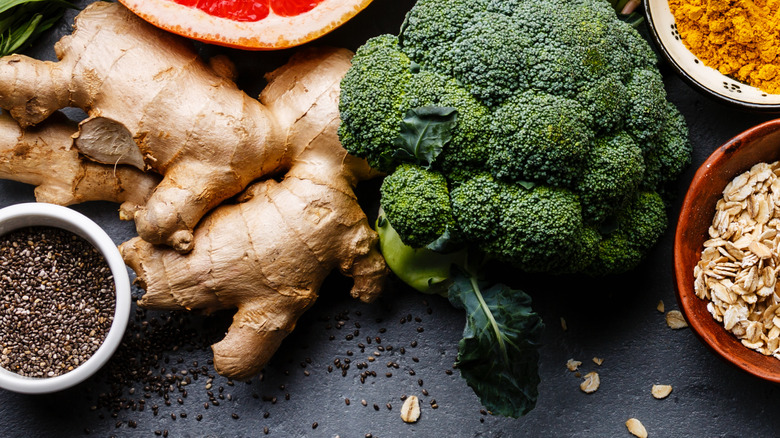
Antioxidants help prevent cell damage, and chia seeds contain lots of antioxidants that could help protect the body. One of the most powerful antioxidants found in chia seeds is quercetin. According to Mount Sanai, quercetin can combat free radicals in the body that are responsible for cell damage and cell death. It also may play a role in combating multiple potential health problems, like high blood pressure, cancer, and heart disease.
Caffeic acid is another antioxidant you’ll get when you eat chia seeds. Caffeic acid is also in tea and coffee, and it’s known for its ability to prevent cellular damage from cancer by stopping the formation of cancer-causing compounds (via Frontiers in Oncology). And, the antioxidant kaempferol not only protects against cancer by inducing cell destruction, but it’s also been shown to safeguard healthy cells in the body (via Food Chemistry). Combining chia seeds with other antioxidant-rich foods, like kidney beans, apples, and dates, could be an excellent way to make sure you’re getting a healthy amount of antioxidants daily.
There are creative ways to add them to your diet
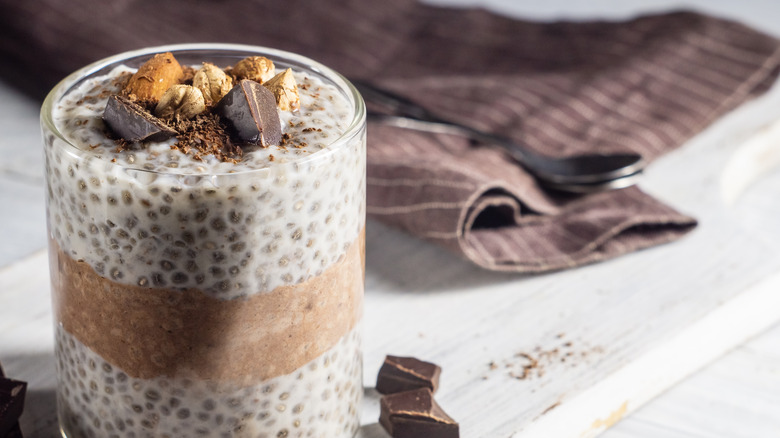
Have you tried adding chia seeds to your daily routine but can’t get past their crunch? Start experimenting with other ways to get them into your meals.
The Harvard T.H. Chan School of Public Health suggests blending water and chia seeds to make chia gel (or mixing them with another liquid like almond milk), then topping the creation with nuts or fruit for a quick, easy dessert. You can also keep seeds hydrated for several days to allow sprouts to form and use the sprouts instead of the seeds for garnish. Bakers also use a precise mixture of chia seeds and water to substitute for eggs, which is perfect for vegan recipes.
There are plenty of other ways to get your daily dose of chia without the overwhelming crunch. Beat them into a cake mix or work them into a homemade breakfast bar recipe. If you jar homemade jams, try adding chia seeds to them to add texture and nutritional value. You can also toss some seeds into your favorite salad dressings, stir-fry meals, or dip recipes (via Healthline).
Source: healthdigest
